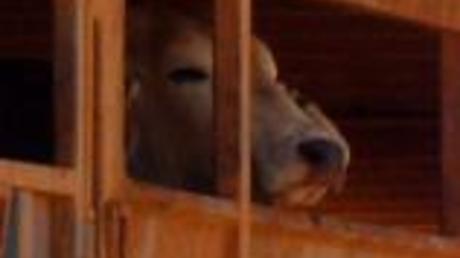
What have our political parties had to say about animal welfare and what would change, if anything, if the Coalition took office?
Animal welfare is primarily a state responsibility. Nonetheless, the issue of live animal exports is firmly on the national agenda in a way that is quite unprecedented. Prime Minister Kevin Rudd travelled to Indonesia for talks early this month. Live animal exports were a priority matter.
Of course, live animal exports aren't on the agenda because the government put it there. Animal activists, with the help of the ABC’s Four Corners, turned live animal exports into a political issue by broadcasting shocking treatment of Australian livestock at overseas abattoirs.
The issue of live animal exports is firmly on the national agenda in a way that is quite unprecedented
Now neither farmers, nor activists, appear willing to let the matter rest. They have diametrically opposed objectives. One wants the trade guaranteed no matter what and the other wants the trade banned for all time.
Exporter Supply Chain Assurance System
Sitting between those two positions is the Federal Department of Agriculture, Fisheries and Forestry’s ‘Exporter Supply Chain Assurance System’, commonly referred to as ESCAS. ESCAS is designed to allow Australian animals to be tracked as they move from Australia to slaughter in Indonesia or the Middle East. Those who purchase, handle and kill the animals should do so according to internationally agreed standards, which typically means compliance with the World Organisation for Animal Health, also known as the OIE.
ESCAS is intended to allow exporters to stop trading with particular individuals or businesses if those trading partners are found to be in breach of OIE guidelines. ESCAS therefore allows exporters to end particular purchasing relationships without having to halt the entire trade.
However, ESCAS seems to suffer from two serious deficiencies. The first is that authorities appear unable to identify any breaches. The second is that animal activists are apparently able to find and document endless breaches. When publicised, those breaches appear to shock the community, although the impact may be starting to diminish.
The federal portfolio
With the portfolio re-shuffle following Julia Gillard’s departure from the Prime Ministership, Joe Ludwig stepped aside and Joel Fitzgibbon became Minister for Agriculture, Fisheries and Forestry. That portfolio includes animal welfare.
Animal advocates have long argued that wearing both primary industries and animal welfare hats simultaneously is likely to be compromising. Moreover, critics claim that where the interests of those engaged in primary industries come into conflict with animal welfare, the interests of the former tend to prevail at the expense of the later. But all that depends on what you mean by ‘animal welfare’.
For the first time, a single issue animal protection party is running candidates in the federal election
Those involved in animal agriculture tend to think of animal welfare as synonymous with production. Dr Teresa Collins writes that ‘some stakeholders often consider welfare as a means of biological functioning and consider that if an animal has all that it needs for growth and reproduction such as food, water, shelter and healthcare, then it has good welfare’.
She goes on to argue that the community tends to take a wider view. Most non-farmers think of animal welfare as something that includes a good quality of life, even happiness. Animals tightly packed into cages tends to run contra to the community’s perception of what animal welfare should entail.
Given that different sections of the community have such different concepts of what is meant by animal welfare it is perhaps unsurprising that the federal minister responsible for animal welfare struggles to please both farming interests and urban voters. Mr Ludwig appears to have been disliked by farmers and animal activists in equal measure. It remains to be seen whether Mr Fitzgibbon will suffer the same problem.
The Animal Justice Party
Turning to the broader question of the election and animal welfare, one variable that hasn’t been explored yet is what impact, if any, the Animal Justice Party will have. For the first time, a single issue animal protection party is running candidates in the federal election.
Their website doesn’t readily explain what seat their candidates are running for, but the division of candidates into states and territories suggests that they intend to run for Senate seats. So far there is no evidence that the party is informing the policy debate, either among the electorate or within other political parties. But it is early days and electoral politics is a long game.
In summary, the mere fact that animals are on the political agenda is a victory for animal advocates. However, it no doubt doesn’t appear to them as such, especially given a pledge by Opposition leader Tony Abbott to apologise to Indonesia over the 2011 live animal export ban. But the first step towards policy reform is getting your issue on the agenda. The test for animal advocates is whether animals remain on the agenda beyond this election, and the next, and next, and so on into the future.


